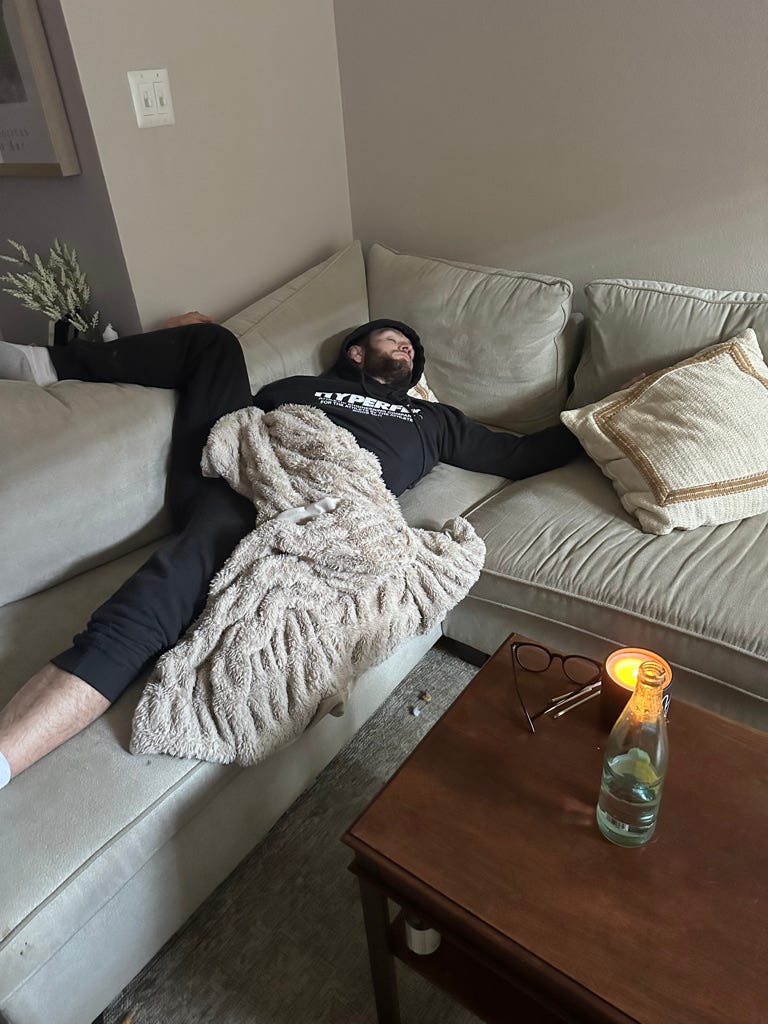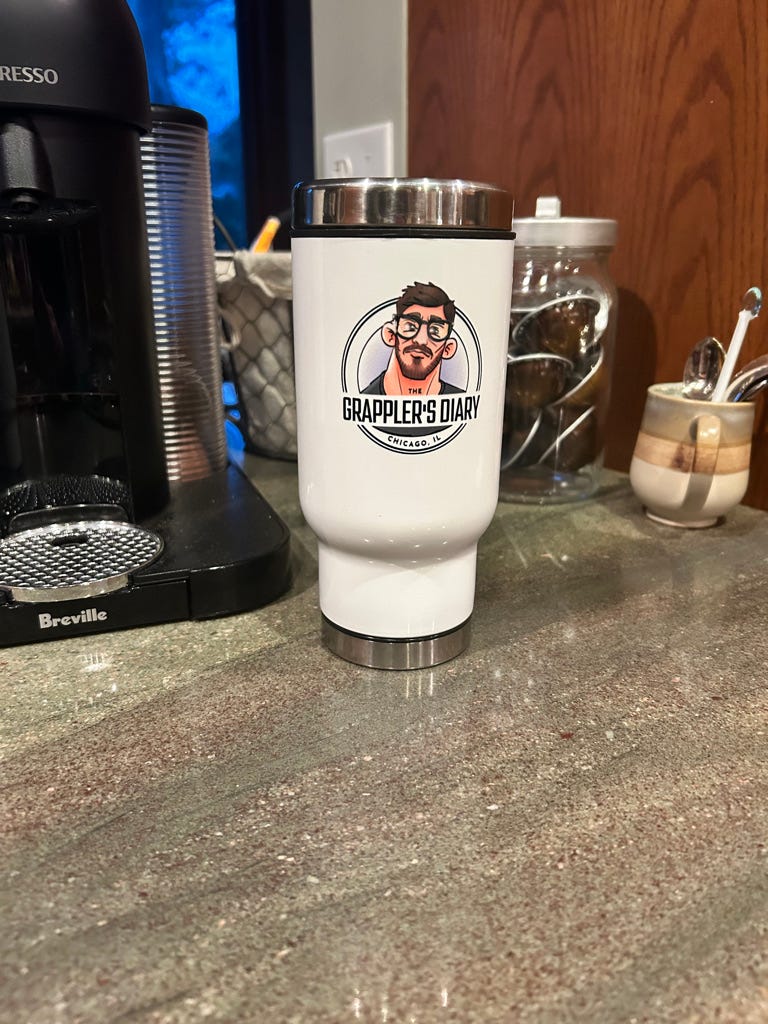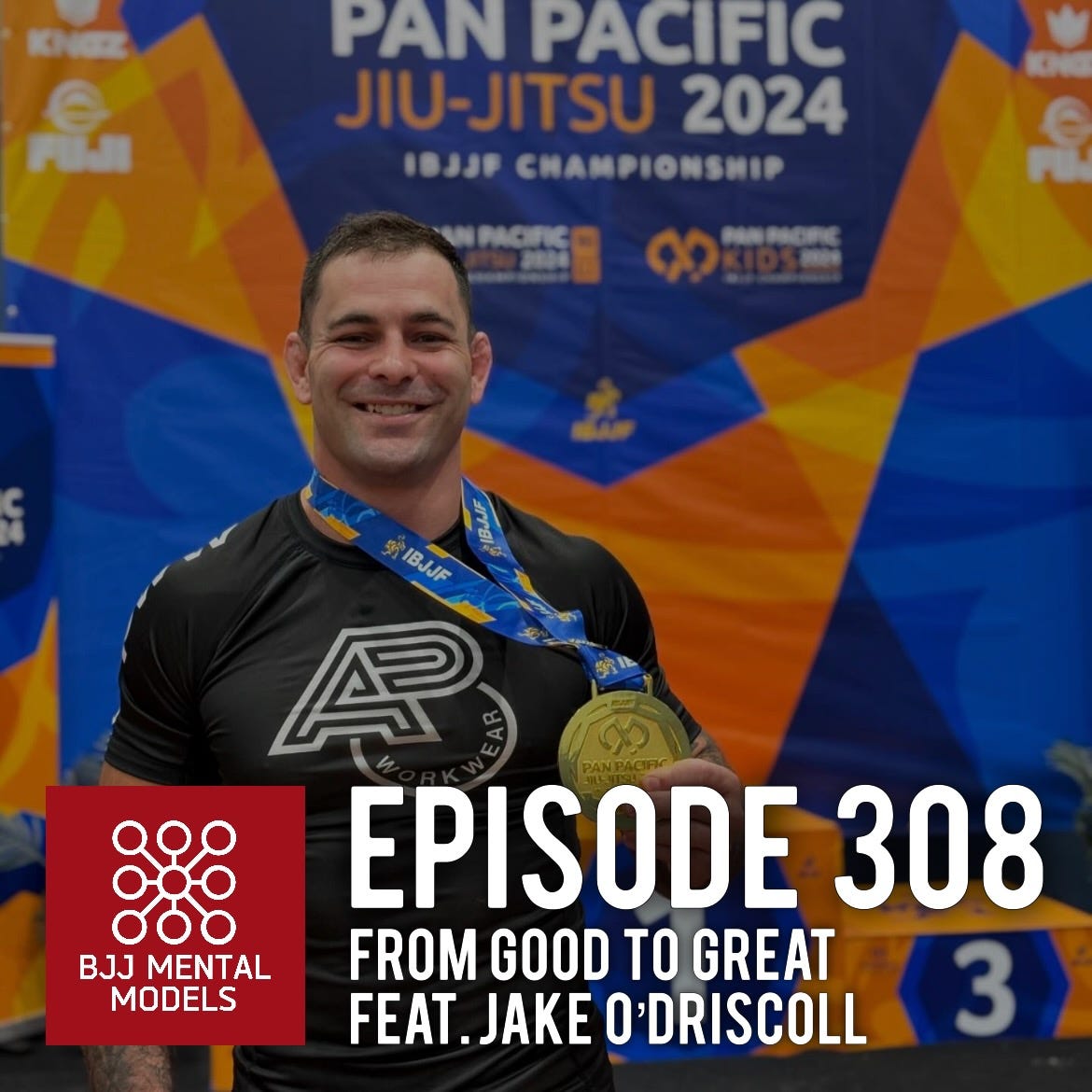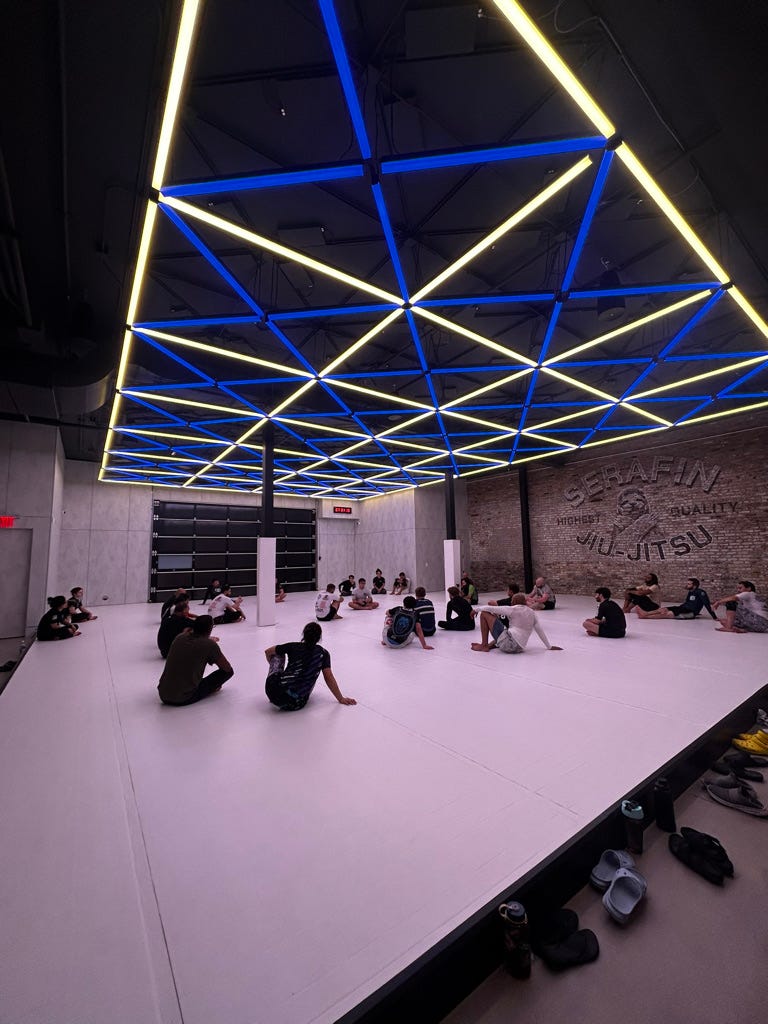I’ve dealt with burnout too many times in my career as both a writer and athlete.
Burnout from overtraining, burnout from teaching, and burnout from writing. It seems like everything I’ve done, at some point I’ve done too hard.
It’s not fun to be burned out.
You’re tired all the time, kind of depressed, and crumbling under the weight of either your expectations or the expectations of the people around you. You want to spend most of your time as I was in the picture above: asleep on the couch, digesting a massive burrito, and watching some silly movie that you’ve already seen dozens of times.
When you’re burned out, life is not the exciting adventure that it normally can be.
Let’s talk about the different kinds of burnout and how you can overcome them.
Circumstantial burnout.
This is also called “overload burnout”, and it’s the most common way to experience burnout.
I think of it as circumstantial burnout because every time I experience burnout like this, it’s because I’m working beyond my capabilities due to an external situation or circumstance.
During ADCC camp, for example, I felt burned out because I was:
Dealing with a significant back injury
Preparing for the most important martial arts tournament of my life
Doing constant media, seminars, and extra study sessions
It was exhausting.
I also felt this burnout when working at a ghostwriting agency earlier this year and running my freelance business a few years ago — tired and like the world was heavy.
Any time I find myself in situations where I’m doing too much (or doing what I’m doing too quickly), I start to drown in my expectations and the work required to do to reach them.
So how do you deal with this kind of burnout?
You start saying “NO”.
Don’t take on new projects until you’ve finished the ones that you’re on. Don’t push yourself so hard, don’t attach yourself to the outcomes so much, and be more gentle with yourself.
Easier said than done, but it’s a lot better than being overwhelmed.
Burnout via boredom.
On the other end of the spectrum is burnout that’s caused by underaction.
I know it might seem like this isn’t a real thing, but burnout is not just caused by overwork. It’s not just caused by doing things — it’s also caused by not doing the right things.
I experienced this type of burnout shortly before I moved to Texas. I was complacent, not making progress, and I was becoming jaded because of my complacency. I felt it in my soul.
See, burnout via boredom is more of a spiritual suicide — where you start to become so disconnected from the work you do that you get sick of it. You can get this from:
Not being challenged
Trying to do work you aren’t passionate about
Spending time with people who aren’t meant for you
This type of burnout is caused by complacency, and the way that you work past it is the opposite of the first type of burnout.
Start saying “YES”.
Put yourself out there more. Test yourself. Try. Risk failure.
Just don’t overdo it, otherwise we’re back at step 1.
Extreme, chronic burnout.
I also think of this type of burnout as “habitual burnout”.
It’s a deeper issue than just doing too much or understimulating yourself.
The main time that I experienced this kind of burnout began years ago as a blue belt and continued on and off through brown belt. I was at that weird age where you’re trying to figure yourself out but you don’t really have any idea what you’re doing, so I decided to bust my ass until I felt some sort of “clarity”.
I was a lower belt and trying to gain some attention for Jiu-Jitsu and writing but I also was hustling so much because I needed money that I built problematic feedback systems that still plague at times to this day.
I didn’t sleep normally for weeks on end, I would train until my body was making clicking sounds as I got out of bed (at 23), and the worst part was that I started to internalize my burnout. The identity of being an exhausted and overworked person who was still coming up short became a part of who I was.
I was on a slippery slope to something bad.
But how do you beat this type of burnout? How do you beat this sort of chronic fatigue?
It’s tough. I think this is the most challenging type of burnout because you don’t just harm your body and your mind, you develop habits that lead to further burnout. It’s like being an alcoholic who lives next to a bar, except in this case the bar is anything you do and want to do well.
To beat this type of burnout, you need to change. Even that might not be enough. You need to re-engineer the way you think about your work.
For me, habitual burnout has been a part of my life as long as I’ve had ambitions. It’s always “a little more” or “a little faster” until I’m drowning, overwhelmed, and maybe even injured. Then, we have to start over.
What helped me was:
Journaling
Rediscovering hobbies
Spending time with friends/my girlfriend
What’s important is not what you do, but rather that what you do allows you to reclaim a sense of agency in your life. You need to feel (at least a little bit) like you have the power to impact your situation.
That’s what burnout really is — powerlessness.
Closing Thoughts
I write this article from the place of someone who is in the middle of a marathon couple of weeks.
Next week, I’m competing in a literal Jiu-Jitsu marathon, but more on that in a few days.
I’ve been traveling for 2 weekends in a row, I’m going to get on a plane again tomorrow, and I’m going to have one week at home before I have to test myself again. It’s a lot of pressure, effort, and anxiety. It’s busy. There’s not much time to decompress.
However, one thing I try to remind myself is that this pressure is a part of what I do. One day, I’m not going to be able to compete or travel all the time anymore, and when that happens, I don’t want to be longing for it like it’s an entry of my life that I didn’t quite finish.
Burnout is not a sign that you need to give up, it’s a sign that you need to adjust your approach. It’s a sign that you need to work a little smarter. A sign you need to think a little better.
You just need to make sure you recognize that before you build bad habits that keep you stuck in your ways for years on end.
The Grappler’s Diary travel mug is now live!
This was the most requested piece of merch that I had at my seminars last weekend and it’s now available for online purchase.
I have a special discount code for all my Substack readers as well — “Substack10”.
The Grappler’s Diary is sponsored by BJJ Mental Models, the world’s #1 Jiu-Jitsu podcast!
This week we're joined by Jake O'Driscoll! Jake is the black belt head coach at Essence BJJ in Perth, Australia.
Best known for coaching Adele Fornarino to her incredible 2x ADCC 2024 World Championship win, Jake is also an accomplished competitor in his own right, having just won the IBJJF 2024 Pan Pacific No-Gi Heavyweight Championship in Masters 1.
In this episode, Jake shares lessons on crossing the gap from good to great, and what separates the best in the world from the other outstanding grapplers in the sport.
To listen, look up BJJ Mental Models wherever you listen to your podcasts or just hit this link.
The Grappler’s Diary is also sponsored by Gym 1801.
Gym 1801 is a brand-new martial arts and fitness facility in Evanston, Illinois.
Apart from being one of the most beautiful Jiu-Jitsu gyms in the world (and run by the man who gave me my black belt in BJJ), Gym 1801 offers world-class instruction, facilities, and training.
Additionally, the gym offers top-class recovery tools like cryo, red light therapy, and sauna, and a wide array of classes like yoga, HIIT, and athletic training. They have everything you need to reach your potential on and off of the mat. (Hit this link to view a video tour of Gym 1801 by me!)
When I think about what I want in a dream Jiu-Jitsu Academy, Gym 1801 has everything I could think of and more.
Also published this week:
The Perfect Jiu-Jitsu Gym Doesn't Exi...
Last weekend, I was in Chicago for a busy weekend of teaching, training, and seeing friends and family.
Thank you for reading another edition of The Grappler’s Diary!
If you enjoyed reading this article, share it with friends! Or, click on the ❤️ button on this post so more people can discover it on Substack!








